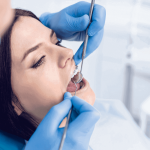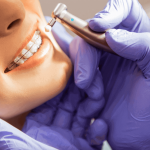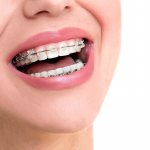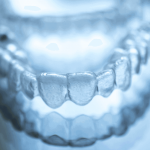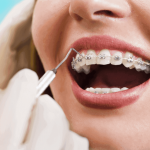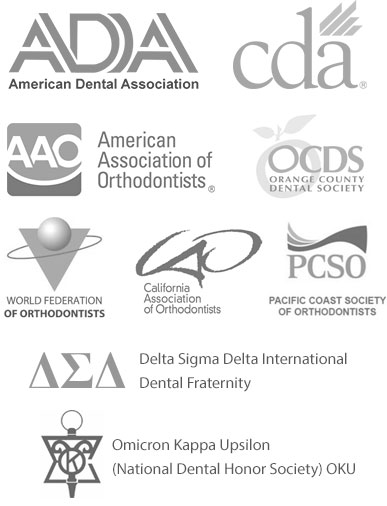FAQ
What is orthodontics?
Orthodontics is a special field of dentistry that involves the diagnosis, prevention, and treatment of improper bites (malocclusions) caused by a disproportionate jaw, tooth irregularities, or a combination of both. The name is derived from the Greek words “ortho,” which means straight, and “odontos,” which means teeth.
What is an orthodontist?
An orthodontist is an orthodontics specialist. Orthodontists are required to receive more formal education compared to dentists to specialize in aligning and straightening teeth and jaws. Orthodontists will graduate from dental school and continue their education for another two to three years in an accredited orthodontic residency program.
Orthodontists only practice orthodontics and utilize orthodontic appliances such as clear aligners, braces, and other devices to provide patients with optimal results. They receive on-going education to ensure they are up to date with the latest orthodontic technology and development.
Our orthodontists are active members of the American Dental Association, World Federation of Orthodontics, California Dental Association, American Association of Orthodontists, Orange County Dental Association, Omicron Kapa Upsilon (National Dental Honor Society OKU, and Delta Sigma Delta International Dental Fraternity.) They have also all earned the Invisalign®️ Preferred Provider status.
How do I know I’m seeing a trained orthodontist?
Look for an orthodontist who is a member of the American Association of Orthodontists. All members are required to verify their education before joining.
What is the right age for the first orthodontic consultation?
There is technically no “right age” for a first consultation as anyone with occlusal problems can benefit from receiving orthodontic treatment. iSmiles Orthodontics recommends early intervention consultations bi-annually starting at the age of seven to monitor your child’s development.
The most common time to begin orthodontic treatment is between ages twelve to fifteen. Surveys have shown that adults make up 25% of orthodontic patients as they want their smile to look as good as possible. iSmiles Orthodontics provides customized treatments for patients of all ages.
Am I too old for orthodontic treatment?
There is no age restriction when it comes to orthodontic treatment. Orthodontic treatment is also used to treat other issues such as gum recession, periodontal disease, jaw disorders, and missing or broken teeth. It is never too late to receive orthodontic treatment.
What is an Occlusion and a Malocclusion?
Occlusion is defined as the relationship between your lower (mandibular) and upper (maxillary) teeth as they come into functional contact. The occlusal (chewing) surfaces of your teeth will affect your other teeth, gums, jaw muscles, head, neck, and oral health.
Your teeth must be precisely arranged to achieve a functional and esthetic bite.
Malocclusion translates to “bad bite.” This can be caused by misaligned, crowded, protruding, or crooked teeth. Malocclusions can affect your oral health, facial shape, and how you eat and speak.
What are the causes of Malocclusions?
Malocclusions, which include teeth crowding, uneven spacing, missing or extra teeth, cleft palate, and other jaw irregularities, are usually inherited.
Other malocclusions are acquired as a result of tongue thrusting, thumb-sucking, premature loss of baby or adult teeth, medical problems, accidents, or dental disease. These orthodontic problems can worsen if they are left untreated. Crowded and crooked teeth can cause tooth decay, tooth loss, and gum disease as they are difficult to clean. A bad bite can cause difficulties in eating.
Can crooked teeth correct themselves over time?
No. Studies have shown that most dental and occlusal problems will deteriorate if they are not treated. After the first permanent molars have erupted, the space for the remaining teeth will not increase. They will actually decrease with time.
Can a child’s remaining growth correct an orthodontic problem?
It is usually unlikely. The growth can help your orthodontist treat skeletal imbalances but will not solve the problem. Braces and other orthodontic appliances will optimize a child’s jaw and teeth. Subsequent growth can worsen a child’s bite if the growth pattern is very abnormal.
Can I have braces if I have missing teeth or crowns and bridges?
Absolutely. A tooth with any dental restoration can be aligned as your natural tooth if the surrounding tissues and roots are healthy. If you have missing teeth, orthodontics can help realign your remaining teeth. In some cases, orthodontics can partially or completely close the gaps left by missing teeth.
Do I need a referral to set up an orthodontic consultation?
No. Many of our patients are referred by their general dentist, but anyone can schedule a consultation. We offer a Complimentary iSmiles Consultation.
What is the purpose of the Complimentary iSmiles Consultation?
The first Complimentary iSmiles Consultation provides an overview of our approach to creating healthy, beautiful smiles. During your first visit, you will:
- meet our front office team, who will help you complete paperwork;
- receive a personalized tour of our office;
- take X-rays of your teeth and gain a better understanding of your orthodontic needs;
- have any questions or concerns addressed.
Our orthodontist will give you a thorough examination and analyze your X-rays to explain and develop an ideal treatment plan for you. If you have any questions, we will be happy to address your concerns.
How soon can I get my braces?
After your Complimentary iSmiles Consultation, there is no waiting period before your treatment can begin. Patients can receive braces within a week or two after the consultation.
How much will treatment cost? Do you offer payment plans?
Treatment costs are difficult to determine without an initial consultation and treatment plan. We will evaluate the cost of your treatment during your Complimentary iSmiles Consultation. We offer six flexible payment options, including a 0% In-Office Financing (no credit checks).
Will my dental insurance plan cover orthodontics?
Insurance for orthodontic treatments is usually treated as a separate benefit.
The benefits usually cover around 50% of your total orthodontic treatment cost. Our team can research your benefits and discuss them with you during your consultation. If you have any questions about filing your claims, we will be happy to assist you.
Does iSmiles Orthodontics offer retainer insurance?
Yes! We offer a Retainer Replacement Insurance program that provides patients with six single arch replacement retainers over three years after their orthodontic treatment.
How often will I need to be seen during orthodontic treatment?
Our orthodontist will determine how often you need to schedule an appointment based on your specific needs and progress. Typically, patients are seen every six to ten weeks. Younger patients in our Early Intervention Program are usually seen every six to seven months.
Can I have all my appointments after school?
Our team will do our best to accommodate your schedule. A majority of our patients are students, which makes it impossible to see everyone before or after school hours. Our office offers convenient hours, seven days a week. Your child should not miss too much school while receiving orthodontic treatment.
Will I need to have permanent teeth removed?
Our orthodontists believe in using a no extraction approach. Our patients will retain all of their permanent teeth while receiving treatment. This is important for younger patients who have teeth crowding. We will correct the crowing to create sufficient space for their remaining teeth to grow.
Does it hurt to get braces?
Braces typically will not hurt. However, your teeth may become sore or sensitive after first receiving braces or adjustments.
Do you offer braces that are more cosmetically pleasing?
iSmiles Orthodontics is happy to offer a variety of options, including clear ceramic braces, traditional metal braces, self-ligating Damon®️ Braces, lingual braces, Invisalign®️ Teen, and Invisalign®️ clear aligners.
Can I go back to school or work after getting my braces?
Yes! The discomfort after receiving braces should not prevent you from your daily activities.
Will having braces affect my regular, everyday activities?
It may take time to get used to having braces. Your teeth may become more sensitive, but braces will not stop you from your normal routine.
Do I need to continue my dental check-ups during orthodontic treatment?
Yes! Braces will not affect dental examinations and cleanings.
How often do I need to brush with dental braces?
We recommend brushing within five minutes after you eat, whether it’s a snack or a meal. Frequent brushing will help your teeth be free from cavities.
Why do I need to wear rubber bands?
The braces will straighten your teeth, while the rubber bands will help your lower and upper teeth fit together.
How often do I need to wear my rubber bands?
You should be wearing your rubber bands for twenty-four hours every day. You will only remove them to eat and brush. If you do not wear your rubber bands as directed, it will prolong your treatment.
Do I need to protect my teeth during contact sports?
Braces will not prevent you from engaging in sports. You should wear a mouth guard to protect your teeth and mouth from injuries. A custom-fit mouth guard will fit comfortably and snug on your teeth.
What is the best type of mouth guard?
Your mouth guard should stay in place and not affect your breathing and talking. The best mouth guards are the ones customized by your dentist or orthodontist.
Can I play a wind instrument with braces?
Braces will not prevent you from playing a wind instrument. However, it may take some time to get used to playing with braces.
How long will my orthodontic treatment last?
The duration of treatment will vary based on your age, the complexity of the case, and whether you’re following our instructions during treatment. Most treatments last from twelve to thirty months, with an average of twenty to twenty-two months. iSmiles Orthodontics offers the latest technology, which allows us to complete many treatments with fifteen to eighteen months. We will provide each patient with an estimated timeframe during their initial consultation.
What is orthodontic retention?
The retention phase will begin immediately after your braces are removed. Retainers are used to maintain the new positions of your teeth.
In the case of an emergency, what do I do?
Typically, emergencies are rare in orthodontics. We will provide you with thorough instructions to temporarily resolve any inconveniences you may encounter with braces. If your braces are causing you severe discomfort, pain, or are broken, please contact us. We will schedule an emergency appointment if needed.



